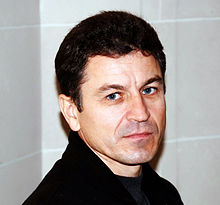Grigory Mikhailovich Pasko
Grigory Michailowitsch Pasko ( Russian: Григорий Михайлович Пасько , scientific transliteration Grigorij Michajlovič Pas'ko ; born May 19, 1962 in Kreschtschenowka in Cherson Oblast , Soviet Union ) is a Russian journalist and editor of an environmental magazine.
Life
Pasko is the son of a village teacher. He graduated from the journalism faculty of the military college in Lviv in 1983 and completed his training as an editor at a Russian military university in 1993. He began his professional career in the Russian army as a correspondent. In 1983 he became a member of the CPSU , from 1983 to 1997 he was editor of the newspaper Kampfwacht (Russian: Боевая вахта ), a publication of the fleet stationed in the Pacific .
Condemnation
In November 1997, Pasko was arrested and charged with espionage after he published articles on environmental issues in the Japanese press and filmed the dumping of nuclear waste by a Russian military ship into the Japanese sea . For this he was sentenced to three years imprisonment for abuse of office in July 1999 and set free with an amnesty. In June 2001, Russia's Supreme Military Court overturned the verdict and rescheduled the case. The following month, Pasko was discharged from the army and worked as an editor for Novaya Gazeta . In December 2001 he was sentenced to four years imprisonment for treason with disregard of military rank and medals. In 2003 he was released from prison.
publicist
Pasko is a member of the Russian PEN center and lives in Moscow . He wrote two books about his imprisonment and the Russian judicial system. Articles of his are published on the homepage of Robert R. Amsterdam, the international lawyer of Mikhail Khodorkovsky . They mainly deal with the Russian state system and the Baltic Sea pipeline . His first film (2009) is also about the latter.
Pasko was treated in Germany in 2008 due to a serious illness caused by detention, and Reporters Without Borders collected donations for it.
Honors
In 1989, Pasko was awarded the 1st degree medal for excellent leadership in military service (Russian: За отличие в воинской службе). In 2002, the organization Reporters Without Borders awarded Pasko its human rights award . In the same year Pasko received the Prize for the Freedom and Future of the Media from the Media Foundation of Sparkasse Leipzig for his reporting on the illegal disposal of nuclear waste by the Russian army. In 2007 he received the special prize for the Erich Maria Remarque Peace Prize for his prison diary, The Red Zone .
Works
- The red zone - a prison diary , Wallstein Verlag, Göttingen 2006
- Honey cake - a guide to surviving behind bars . Wallstein Verlag, Göttingen 2006
- Buried At Sea , film about the Nord Stream Pipeline , 2009
- Why don't you write what I see? In: Berliner Zeitung , August 20, 2007; Interview with Grigori Pasko about the dependency and buyability of the press under Putin
Web links
- Literature by and about Grigori Michailowitsch Pasko in the catalog of the German National Library
- Texts by Grigori Pasko in German and English (scroll: "Grigory Pasko")
- Laudation for Grigori Pasko on the special prize of the Erich Maria Remarque Peace Prize 2007 (September 21, 2007)
- Paskos short biography on magazines.russ.ru (Russian)
- Pasko's biography on the website of the Russian PEN
- Pasko's career on the homepage of the Moscow Sakharov Center
- Buried At Sea by Grigori Pasko at the Baltic Film Festival Berlin with subsequent discussion (October 20, 2009)
Individual evidence
- ↑ ROG thanks: Grigori Pasko's treatment secured ( Memento from October 14, 2008 in the Internet Archive )
- ↑ Laureate 2002: Grigorij Pasko ( Memento from April 15, 2014 in the Internet Archive ) Leipziger Medienstiftung, May 2, 2002
- ↑ Buried At Sea - film about the Baltic Sea pipeline . In: Frankfurter Rundschau , January 10, 2009
| personal data | |
|---|---|
| SURNAME | Pasko, Grigory Mikhailovich |
| ALTERNATIVE NAMES | Пасько, Григорий Михайлович (Russian); Pas'ko, Grigorij Michajlovič (scientific transliteration) |
| BRIEF DESCRIPTION | Russian journalist |
| DATE OF BIRTH | May 19, 1962 |
| PLACE OF BIRTH | Kreschtschenowka , Soviet Union |
